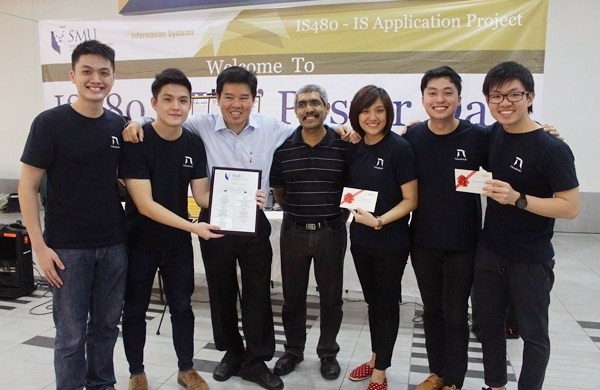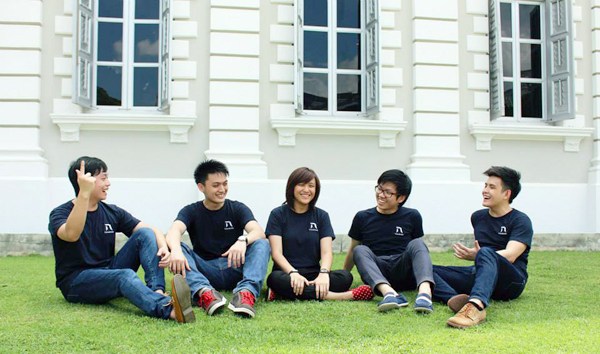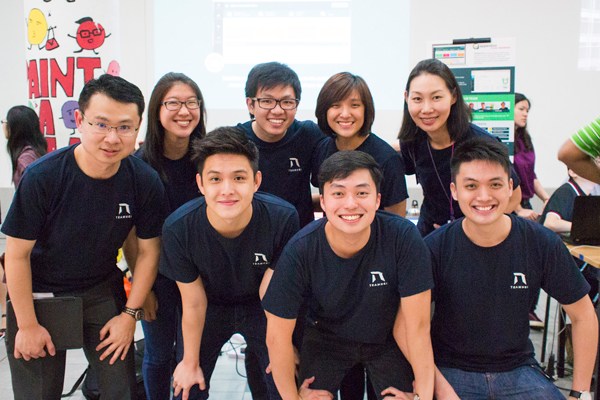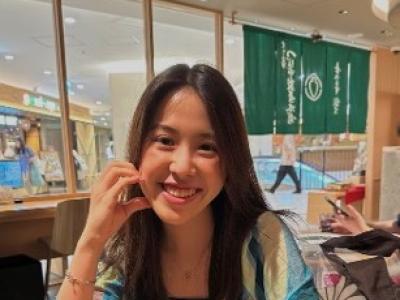
IS480, also affectionately known by SIS students as the Final Year Project, is a rite of passage which all SMU School of Information Systems undergraduates must undergo as part of the curriculum.
Despite the demanding workload and challenges presented by IS480, many SIS students feel that it is the one module which best prepares them for working life in the information systems industry. In this post, the members of Team Hei– winner of the Best IS480 – share more details about IS480, and why it was a monumental moment in their SMU journey.

Team Hei comprises five members: (from left) Kong Yu Ning, Ngoh Jun Dat, Jasmine Lin Qianru, Chester Chiew Wei Hong, Keith Tan Xiang Wei
What is IS480?
Jundat: IS480 is a compulsory module for SIS students. It serves as an apex of sorts, to test us on the project management and technical skills that we have accumulated thus far.
Specifically, IS480 requires students to work with real corporate clients on live projects and use cases, in teams of 4-6 members. Many of these projects are immensely challenging, and at times seem more than what a mere student team can accomplish. As such, IS480 is notorious amongst the SIS community for its intensity, steep learning curve and tremendous amount of effort required.
The birth of Team Hei, and our collaboration with IDA
Keith: Prior to IS480, the five of us had the opportunity to work together in other classes. Since we really enjoyed working together, we decided to team up for IS480 as well. We named ourselves Team Hei because the word “hei” means five in Hebrew, denoting the number of people in our team. The number five also connotes blessings and perfection in the Hebrew culture, elements which would be undoubtedly important in our journey.
Within the framework of IS480, students can either propose their own project, look for a corporate firm to partner with, or pick from a list of projects that the school’s partner companies have proposed. Team Hei went with the second option and got the Infocomm Development Authority (IDA) to partner with us. This opportunity came around because I happened to intern with IDA during my summer vacation, and they were open to my suggestion of collaborating with them for IS480. IDA wanted us to take over a major project of theirs – the development of an Email Analytics system (which we called Apparatus) that they envisage to be used by all government agencies.
To find out more about Apparatus, take a look at our pitch video:
Rising to the challenge
Chester: One significant challenge that we faced was IDA’s requirement that we use C# to develop Apparatus, which was a programming language that we were all unfamiliar with. Since most IDA projects are developed in C#, we needed to align our project with their standards so that IDA would be able to maintain the final product once our involvement ended.
To tackle this challenge efficiently, we assigned each team member as a subject matter expert of a different part of C#, and took turns coaching each other. This approach allowed us to very quickly ramp up our technical competency within two weeks, which we deemed sufficient for us to start our first application feature.
Another challenge was for us to convince the intended users, the government agencies, that Apparatus was capable and robust enough for actual usage. For this to materialise, our team had to produce a minimum viable product by the seventh week of the project. With this product in hand, we were able to conduct presentations and demonstrations to government agencies such as IDA and Ministry of Manpower (MOM).

Throughout the course of their IS480 project, Team Hei developed a great working relationship with their IDA clients: Mr Lim Eyung, Ms Lu Shanshan, and Ms Chloe Lim.
The process of preparing and delivering these presentations was time-consuming, but necessary for convincing the agencies to provide us with real use cases to validate the project. The various agencies’ staff were able to experience what the envisioned system would look like, and were assured of the commitment and quality that we would bring to this project.
The end result: from their experiences with our minimum viable product, the various civil servants who tested Apparatus were impressed with the quality, and vouched they would use it when the final product is rolled out. Not only did this help us validate the project, through the use cases, it also gave our users new insights regarding the behaviour and response of their email recipients. The users’ experiences in turn helped us to prove the true value potential of Apparatus to our users and sponsor, which we believe gave us an edge to winning the Best IS480 Project.
The future ahead
Jasmine: Now that IS480 has come to an end, we have handed Apparatus back to the IDA, where their staff will carry out their standard operating procedure of rigorous testing and screening of the application before it can be deployed. This screening process will take at least a year, after which Apparatus will most likely be rolled out for actual usage by the other government agencies.
Although our role in this project has ended, I am really excited at the prospect of seeing my work being actually put to use by people working in the government agencies. It really bears testimony to the level of our skills and the standard of our project.
IS480 – A landmark achievement in our SMU journey

Team Hei with their Best IS480 award, together with their project supervisor Professor Benjamin Gan and the Associate Dean (Education) of SIS Professor Venky Shankararaman.
Yuning: Through IS480, our group proved our ability to tackle a highly complex project, and at the end of it all, garner the acclaim of the industry judges, our professors, and our client IDA. It was this process of overcoming hardship, along with the the resultant success, that truly convinced us that we are no longer the wide-eyed freshmen who are mystified by the easiest of codes. We are now officially battle-hardened seniors that have survived the most gruelling of projects and emerged victorious; the end of IS480 was truly a pivotal moment where, for lack of a better geeky analogy, the young padawans officially became Jedi masters.

